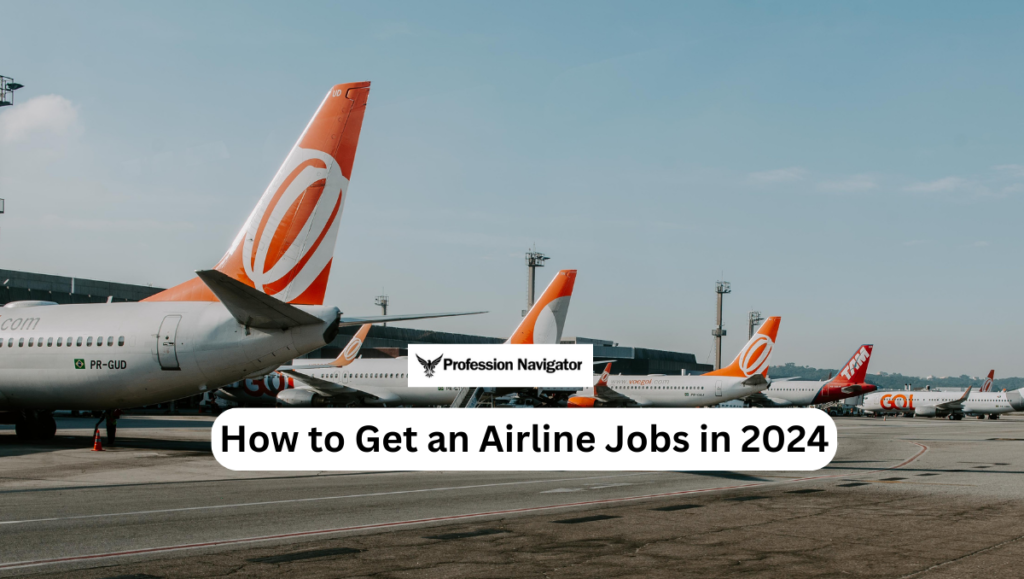Overview of Airline Jobs
Airline Jobs: The airline industry offers a wide range of career opportunities, beyond just the roles of pilots and flight attendants. This industry encompasses various positions such as customer service representatives, technical maintenance personnel, logistics coordinators, and management roles. Each position plays a crucial part in ensuring the seamless operation of air travel services.
Importance of the Airline Industry
The airline industry is a vital component of global transportation, significantly impacting commerce, tourism, and personal travel. It offers stable and often lucrative employment opportunities with potential for career advancement. Additionally, the industry’s growth and innovation continually create new job roles and specialties, making it a dynamic and exciting field.
Table of Contents
Understanding Airline Jobs
What is an Airline Job?
An airline job refers to any position within an airline company that contributes to the operation and support of air travel services. These roles vary widely, from ensuring the safety and comfort of passengers to managing logistics and operations. Airline jobs require a mix of technical skills, customer service abilities, and often, specific certifications.
Visit for the latest Airline Jobs
Types of Airline Jobs
Flight Operations
| Job Title | Description |
|---|---|
| Pilot | Operates the aircraft, and is responsible for the safety of all onboard. |
| Flight Attendant | Ensures passenger safety and comfort during flights. |
Ground Operations
| Job Title | Description |
|---|---|
| Ramp Agent | Handles baggage, cargo, and aircraft preparation. |
| Gate Agent | Manages boarding processes and passenger inquiries. |
Technical and Maintenance
| Job Title | Description |
|---|---|
| Aircraft Mechanic | Maintains and repairs aircraft. |
| Avionics Technician | Repairs and maintains aircraft electronics. |
Customer Service and Sales
| Job Title | Description |
|---|---|
| Customer Service Agent | Assists passengers with ticketing, check-in, and inquiries. |
| Ticket Sales Agent | Sells tickets and assists with reservations. |
Management and Administration
| Job Title | Description |
|---|---|
| Airline Manager | Oversees airline operations and staff. |
| Logistics Coordinator | Manages the supply chain and logistics for airline operations. |
Qualifications and Certifications
Required Skills and Competencies
| Skill | Description |
|---|---|
| Customer Service | Essential for roles involving direct passenger interaction. |
| Technical Knowledge | Critical for maintenance and technical positions. |
| Communication | Important across all roles for effective coordination. |
| Problem-Solving | Ability to handle emergencies and operational challenges. |
Education and Training
- Pilots: Require a commercial pilot’s license and flight hours.
- Flight Attendants: Typically need a high school diploma and training through the airline.
- Technical Positions: Often require technical degrees and certification from relevant authorities.
Certifications
| Certification Type | Description |
|---|---|
| FAA Certification | For pilots and maintenance personnel in the United States. |
| IATA Certification | Various certifications for different airline roles. |
Flight Operations
- Pilot: Pilots are responsible for operating the aircraft, including takeoff, navigation, and landing. They ensure the safety of all passengers and crew members onboard. Pilots must have a commercial pilot’s license and meet stringent physical and technical standards.
- Flight Attendant: Flight attendants are tasked with ensuring passenger safety and comfort during flights. Their duties include conducting safety demonstrations, serving food and beverages, and managing any in-flight emergencies. They must complete training programs provided by the airline.
Ground Operations
- Ramp Agent: Ramp agents handle baggage, cargo, and the preparation of aircraft for flights. Their responsibilities include loading and unloading luggage, directing aircraft to gates, and performing safety checks. This role is critical for maintaining on-time flight schedules.
- Gate Agent: Gate agents manage the boarding process and assist passengers with inquiries at the airport gate. They ensure boarding procedures are followed correctly and handle any last-minute changes or passenger issues.
Technical and Maintenance
- Aircraft Mechanic: Aircraft mechanics maintain and repair aircraft to ensure they are safe and operational. They perform routine inspections, troubleshoot issues, and replace parts as needed. Mechanics must have relevant certifications and often work for maintenance facilities or airlines.
- Avionics Technician: Avionics technicians specialize in repairing and maintaining aircraft electronics. This includes navigation systems, communication devices, and other onboard electronic systems. They require specialized training and certification in avionics.
Customer Service and Sales
- Customer Service Agent: Customer service agents assist passengers with ticketing, check-in, and inquiries. They play a key role in ensuring a positive travel experience for passengers and handle various customer service tasks at the airport.
- Ticket Sales Agent: Ticket sales agents sell tickets and assist with reservations, providing passengers with information about flight schedules, fare options, and travel policies.
Management and Administration
- Airline Manager: Airline managers oversee the operations and staff within the airline. Their responsibilities include managing budgets, developing policies, and ensuring compliance with aviation regulations.
- Logistics Coordinator: Logistics coordinators manage the supply chain and logistics for airline operations. They ensure that all necessary materials and resources are available for efficient airline functioning.
Qualifications and Certifications
Required Skills and Competencies
- Customer Service: Excellent customer service skills are essential for roles involving direct interaction with passengers, such as customer service agents and flight attendants.
- Technical Knowledge: For technical and maintenance positions, a strong understanding of aircraft systems and components is crucial.
- Communication: Effective communication is important across all airline roles to ensure smooth operations and teamwork.
- Problem-Solving: The ability to handle emergencies and operational challenges efficiently is a valuable skill in the airline industry.
Education and Training
- Pilots: Becoming a pilot requires a commercial pilot’s license, which involves extensive flight training and passing rigorous exams. Pilots must also accumulate a certain number of flight hours.
- Flight Attendants: Flight attendants typically need a high school diploma and complete specific training programs provided by the airline, which cover safety procedures, customer service, and emergency response.
- Technical Positions: Technical roles like aircraft mechanics and avionics technicians usually require technical degrees and certifications from aviation authorities, ensuring they have the necessary skills and knowledge.
Certifications
- FAA Certification: The Federal Aviation Administration (FAA) provides certification for pilots, mechanics, and other aviation professionals in the United States, ensuring they meet safety and competency standards.
- IATA Certification: The International Air Transport Association (IATA) offers various certifications for different airline roles, focusing on international standards and practices.
Experience and Career Path
Starting in Entry-Level Positions
- Customer Service Agent: This is a common entry point for many airline careers, involving direct interaction with passengers and handling various service tasks at the airport.
- Ramp Agent: Entry-level ground operations role where individuals can gain experience in handling aircraft preparation and baggage.
Building a Diverse Skill Set
Experience in various airline roles can lead to career advancement. Cross-training in different departments provides a competitive edge and a broader understanding of airline operations.
Networking in the Airline Industry
Building connections with industry professionals is crucial. Joining professional organizations, attending industry events, and leveraging social media platforms like LinkedIn can help in networking and career development.
Crafting a Winning Resume
Highlighting Relevant Experience
Your resume should emphasize previous roles in the airline or customer service industries, highlighting skills that are directly applicable to the job you are applying for. Include any awards, successful projects, or noteworthy contributions to demonstrate your capabilities.
Showcasing Skills and Certifications
List all relevant technical skills and certifications, such as FAA or IATA certifications, that make you a qualified candidate for the position. Tailor your resume to match the job description, incorporating industry-specific keywords to increase the likelihood of passing through automated applicant tracking systems.
Preparing for the Interview
Researching the Airline
Understanding the airline’s history, mission, and culture is essential. Tailor your answers during the interview to reflect how your values and skills align with the company’s objectives and work environment.
Practicing Common Interview Questions
Prepare for questions about your experience and skills. For example, “Describe a time when you resolved a passenger complaint” or “How do you handle stressful situations?” Practice your responses to demonstrate your problem-solving abilities and customer service skills.
Demonstrating Expertise and Enthusiasm
Be ready with specific examples of past achievements that showcase your expertise. Show genuine enthusiasm for the airline industry and the specific role you are applying for. This will help you stand out as a passionate and dedicated candidate.
Navigating the Job Market
Utilizing Job Search Platforms
Use job search platforms such as Indeed, LinkedIn, and airline career pages to find job listings. These platforms allow you to filter job searches based on your preferences and qualifications.
Leveraging Industry Connections
Professional connections can significantly enhance your job prospects. Networking through industry events, social media, and professional organizations can lead to job referrals and insider information about job openings.
Attending Job Fairs and Industry Events
Job fairs and industry events are excellent opportunities to meet potential employers, learn about job openings, and make a personal impression. Bring copies of your resume and be prepared to discuss your experience and qualifications.
Salary and Compensation
Average Salaries for Various Airline Jobs
| Job Title | Average Salary (Annual) |
|---|---|
| Pilot | $70,000 – $200,000 USD |
| Flight Attendant | $30,000 – $60,000 USD |
| Aircraft Mechanic | $40,000 – $80,000 USD |
| Customer Service Agent | $25,000 – $40,000 USD |
Factors Influencing Salary
Salaries can vary based on several factors, including:
- Location: Salaries are typically higher in major hubs due to the cost of living.
- Experience Level: More experienced professionals usually command higher salaries.
- Type of Airline: Major airlines often pay more than regional carriers due to their larger budgets and more extensive operations.
Succeeding in an Airline Job
Building Strong Professional Relationships
Effective collaboration with colleagues and networking within the industry are crucial for career success. Building a strong professional network can lead to new opportunities and career growth.
Continuously Improving Skills
Enroll in ongoing training and certification programs to keep your skills up to date. Staying informed about industry developments and innovations will help you remain competitive and advance in your career.
Managing Stress and Work-Life Balance
Developing stress management techniques and maintaining a healthy work-life balance are essential for long-term success in the airline industry. This can include regular exercise, mindfulness practices, and setting boundaries between work and personal time.
Future Position Options
Advancing to Senior Roles
- Chief Pilot: A senior role where you lead and manage a team of pilots, ensuring compliance with safety regulations and performance standards.
- Senior Flight Attendant: A supervisory role where you oversee and train junior flight attendants, ensuring high standards of service and safety.
Exploring Management Positions
- Operations Manager: Overseeing the daily operations of the airline, ensuring efficiency and compliance with regulations.
- Safety Manager: Ensuring that all airline operations meet safety standards and regulations, conducting safety audits, and implementing safety programs.
Opportunities in Airline Training and Education
- Training Instructor: Teaching and training new airline staff, including flight attendants and ground personnel, on safety procedures, customer service, and operational protocols.
- Flight School Instructor: Training aspiring pilots in flight techniques, navigation, and safety procedures, preparing them for their commercial pilot’s license.
FAQs
What qualifications are needed for airline jobs? Qualifications vary by position. Entry-level roles may require a high school diploma, while technical and senior roles often require advanced degrees and specific certifications.
How long does it take to become a pilot? It typically takes several years, including obtaining a commercial pilot’s license and meeting required flight hours. This process involves extensive training, examinations, and practical flying experience.
What are the key differences between various airline jobs? Differences lie in responsibilities, required skills, and training. For example, pilots operate aircraft, while customer service agents assist passengers with inquiries and ticketing.
How can I stand out in an airline job interview? Research the airline, practice common interview questions, and demonstrate enthusiasm and relevant skills. Providing specific examples of past achievements can help you stand out.
Is a college degree required for airline jobs? Not always. Many positions require specific training or certifications rather than a college degree. For instance, flight attendants and customer service agents typically do not need a degree.
What are the biggest challenges in airline jobs? Challenges include managing stress, ensuring safety, and handling irregular hours and travel demands. Adapting to these challenges is crucial for long-term success in the industry.
How can airline professionals advance their careers? Gaining experience, pursuing further education and certifications, and networking within the industry are key strategies for career advancement.
Conclusion
Summary of Key Points
Airline jobs offer diverse opportunities with varying qualifications and career paths. Success in the industry requires a combination of relevant skills, certifications, and networking. The airline industry provides stable and often lucrative employment with opportunities for advancement.
Encouragement for Aspiring Airline Professionals
Stay dedicated to continuous learning and improvement. Build a robust professional network, and remain adaptable to industry changes. With perseverance and the right qualifications, a rewarding career in the airline industry is attainable.




Pingback: How to Get a Cabin Crew Job in the UK in 2024 - PROFESSION NAVIGATOR